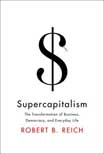In its May 10 issue, The Economist magazine’s editors whined that “we have been appalled by some of the anti-capitalist rhetoric” that Barack Obama and Hillary Clinton have “spouted on the campaign trail.” While it is laughable to characterize either as anti-capitalist, there have been a few moments in the primary campaign when the Democratic candidates have offered much-needed warnings about the dangers that widening inequality and corporate lobbyists pose for democracy.
At these moments, they might be channeling “the Bobs” — Robert Reich and Robert Kuttner, authors, professors, and editors of The American Prospect. Reich, who was a friend of Hillary and Bill Clinton in law school and served as labor secretary in the first Clinton administration before falling out with them over their lack of more progressive action on the economy, accused Sen. Clinton’s campaign of “lacking conviction about anything” and in the spring endorsed Sen. Obama. Kuttner, also a fellow at Demos and one of the co-founders of the left-leaning Economic Policy Institute, was critical of Obama’s position on health insurance early in the campaign, arguing that it was insufficiently progressive. But he later came to Obama’s defense (in response to criticism of the candidate by New York Times columnist Paul Krugman), arguing that Obama’s speech on the financial crisis was courageous, and “showed real understanding and subtlety.”
Whatever their opinions of the presidential candidates, Reich and Kuttner have a broader project. In two recent books, Supercapitalism and The Squandering of America, Reich and Kuttner, respectively, lay out a radical critique of present-day corporate domination of our politics that even liberals can love. They broadly agree, although their differences are instructive. They also raise some interesting questions (partly by critique, mostly by conspicuous absence) for community-development practitioners and community organizers eager to change the political landscape.
Where They Agree: A Dangerous Shift
Both writers look back to the post-World War II era as a “not quite Golden Age” of “democratic capitalism” (Reich), or “managed capitalism” (Kuttner), when the balance between big business, big labor, and (relatively) big government produced broadly shared prosperity, at least for families headed by white male workers. While they are clear that this period was marked by race and gender inequality, Reich argues that from roughly 1945 to 1975,
America struck a remarkable accommodation between capitalism and democracy. It combined a hugely productive economic system with a broadly responsive and widely admired political system … achieved its highest degree of income equality generated a larger proportion of good-paying jobs than before or since, and more economic security than ever for more of its people (Supercapitalism, page 15).
This accommodation was based in the relationship between mass production by a small number of very large corporations (think General Motors, Johnson & Johnson, Sears Roebuck), industry-wide labor unions, and government planning and regulatory bodies that set rules and patterns that governed the economy.
Over the past 30 years, however, this period of more broadly shared prosperity has been almost entirely undermined:
The central institutions of democratic capitalism in the Not Quite Golden Age — big oligopolistic companies, big labor unions organized by industry, and government representing communities and local interests through regulatory agencies — came undone … Power shifted to consumers and investors. Supercapitalism replaced democratic capitalism (Supercapitalism, page 87).
The consequences of this shift from “managed/democratic capitalism” to “supercapitalism,” from employers like General Motors to employers like WalMart, have been stagnant wages, rising inequality, millions without health care, main streets abandoned.
For most Americans, the years since 1973 have been trying times economically, with stagnating real incomes and increased personal financial risks. But they have been terrific for the top 10 percent, even better for the top 1 percent, and best of all for the superrich (The Squandering of America, page 7).
Kuttner and Reich agree that there are not only economic consequences, but profound political ones as well. Corporations have become increasingly dominant in government, drowning out the voice of citizens, converting politics into one more space of supercapitalist corporate competition, and increasing cynicism about democracy.
In a market economy, where concentrated wealth has disproportionate political power, the only thing that keeps elites from wreaking self-interested havoc is robust democracy; but democracy is also in disrepair. (Squandering, page 267).
This is not simply the work of the Bush administration, Republicans, or conservative think tanks, according to Kuttner, though all have done their part. Democrats too have abandoned a progressive economic philosophy, with business interests and market ideology trumping the interests of working Americans.





Comments